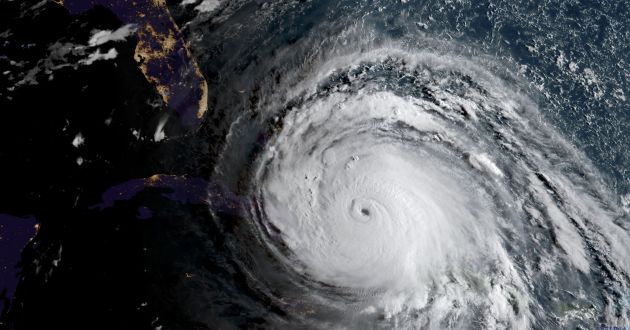 Could the rapid onset of destruction be caused by climate change? Photo: AR
Could the rapid onset of destruction be caused by climate change? Photo: AR
After days of destruction and continued media coverage in Australia, Hurricane Irma has now dissipated in most regions, leaving evacuated citizens from states such as Florida sitting in bumper-to-bumper traffic to head home and face monumental cleanups.
In the aftermath of the disaster, a major discussion point to emerge from the news coverage of Irma was a topic sparked by Hurricane Harvey a few weeks ago, and that is about the role of climate change in such intense storms.
In this opinion piece, Ethan Nash takes a look back at how the ABC has covered the discussion, where climate change fits into the equation, and some of the evidence from government departments.
BACKGROUND:
Two weeks after Hurricane Harvey brought unprecedented flooding to Houston, Hurricane Irma has now the Caribbean and into the southeast US.
Irma spent three consecutive days as a category 5 storm – a new record in the satellite era – and its maximum wind speeds of 185 mph put it joint-second for the strongest hurricane winds in recorded history.
The storm has now caused catastrophic damage in Florida, Barbuda, Saint Barthélemy, Saint Martin, Anguilla and the Virgin Islands, with damage bills estimated to be over $200 billion.
As a result of this damage, news outlets like the ABC were quick to jump on the fearmongering bandwagon of assuming that climate change is directly responsible for the unpredictability of weather outside of ‘normal seasonal observations’, a notion seemingly published without looking at any of the evidence first.
MEDIA QUOTES:
Let’s take a look at some of the language used by ABC in an article entitled, Irma and Harvey: Two very different storms both affected by climate change.
In this article, the author begins with a background of the event, and then proceeds to explain how hurricanes are traditionally formed with several vital ingredients:
“These include an initial disturbance in the atmosphere for the storm to form around, very warm sea surface temperatures to sustain the storm, and a lack of vertical wind shear so the storm is not torn apart during its formation.
The climate change influence is clear for the sea temperatures, but not so much for the other ingredients required in forming hurricanes.
While we have low confidence in the effect of human-caused climate change on hurricane formation, it is clear that climate change is enhancing some of the impacts of these storms.”
As you can see, the argument of climate change causing the formation of storms is quickly dismissed due to low confidence, with the article instead focusing now on how climate change is an ‘enhancement mechanism’:
“Climate change might have contributed to the stalling effect, but what’s clearer is that climate change is making intense extreme rainfall events like we saw over Houston more likely. By warming the atmosphere we’re also increasing its capacity to carry moisture.
When we have the trigger for heavy rainfall, climate change makes it rain harder. Irma’s main impacts have been through the storm surge, the strong winds and the heavy rains.
Climate change has likely worsened the effects of Irma. As described above, we know that climate change is intensifying extreme rain events.
We also know that climate change is worsening storm surges by raising the background sea level on which these events occur.
Sea levels are projected to rise further over the coming century, by 50 to 100 centimeters under a high greenhouse gas emissions scenario, and 20 to 50 centimeters if we greatly reduce our emissions.
So while it’s likely that climate change is contributing to more extreme hurricanes, we have even more confidence that climate change is worsening the impacts of these storms, and will continue to do so over the coming decades.”
The author of the article then continues on with a look at Australian weather before concluding, leaving most scratching their heads about the information they have just read, and makes no further attempt to explain the claims above. This is a classic Orwellian tactic, executed well in this piece.
Where do I start? The constant switching between assumptive and passive language tones? The confusing correlation between confidence and backtracking? The lack of hyperlinks for broad claims? Climate change makes it rain harder? Come on. The author even uses the words ‘likely’ and ‘we know’ in the same sentence.
Feeling confused, I searched to find other proponents of the enhancement mechanism theory, in hopes of discovering an explanation to the broad and context-lacking ABC article.
Related: Analysing Mass Media – Fear and Manipulation
During my research, I was able to find four main points of argument the author is trying to express in the article above. These four points are: Season Length and Seasonal Patterns, Regions of Formation and Intensification, Rapid Intensification, and Storm Size.
Through this, what proponents of the theory are presenting is that evidence of storms forming outside of normal seasonal patterns, mixed with rising ocean temperatures causing a shift in formation, means that the rapid onset and sizes of is a subsequent result of climate change.
This is all based off famous NOAA data of seasonal occurrence of Atlantic hurricanes, which supposedly demonstrates that we are at peak season right now.
Seems a little more logical when you eliminate the media from the process. But how must truth is behind the claims? What does the NOAA actually conclude? Let’s read for ourselves.
THE NOAA EVIDENCE:
Despite the sensationalism circulating online, The National Oceanic and Atmospheric Administration and others have already published detailed evaluations of the impact of climate change on hurricane strength and prevalence – and it’s nothing like what the media is telling us.
NOAA’s Geophysical Fluid Dynamics Laboratory have released a report stating it was premature to conclude that human activities — and particularly greenhouse gas emissions that cause global warming — have already had a detectable impact on Atlantic hurricane or global tropical cyclone activity.
“In summary, neither our model projections for the 21st century nor our analyses of trends in Atlantic hurricane and tropical storm counts over the past 120+ years support the notion that greenhouse gas-induced warming leads to large increases in either tropical storm or overall hurricane numbers in the Atlantic.
One modelling study projects a large increase in Atlantic category 4-5 hurricanes over the 21st century, but we estimate that this increase may not be detectable until the latter half of the century.
Therefore, we conclude that despite statistical correlations between SST (sea surface temperatures) and Atlantic hurricane activity in recent decades, it is premature to conclude that human activity — and particularly greenhouse warming — has already caused a detectable change in Atlantic hurricane activity.”
This is a notion further correlated and concluded in a 2015 computer modeling study by John Dwyer and co-authors at Columbia University:
“Ultimately, there is not yet a consensus on how the length of the [tropical cyclone] season will change as a result of anthropogenic effects.”
A recent climatological study led by James Kossin at University of Wisconsin suggested a poleward shift of the hurricane maximum intensity location in a warming climate, but didn’t have enough concrete evidence to support the claims, expanding on the frustrations in the report:
“Unlike the connection between hurricane intensity and the ambient environment, the linkage between global circulation change and hurricane movement is much harder to quantify at present.
From a scientist’s perspective, the lack of understanding of climate impacts on hurricanes is disappointing, if not irritating. On the other hand, these uncertainties continue to motivate us to search for any possible link between hurricanes – including their intensity, frequency, time of formation and location – and climate. Better understanding of hurricane-climate relation is needed, as ultimately that knowledge can help serve society.”
Indeed, just a quick search of rebuttals to the enhancement mechanism theory will easily challenge the fearmongering published by the ABC. The only grounds proponents have to stand on are odds that anthropogenic warming over the next century will lead to an increase in the occurrence of very intense tropical cyclone in some basins. However, as shown above, even if this is the case – it’s not happening now.
In fact, even the NOAA has concluded it is premature to assume that greenhouse warming is causing detectable change at the present time.
Despite this, tax-payer funded outlets like the ABC continue to push their agenda of spin and deception, leaving readers to trust the words of the publishers and assume the information is correct.
The mainstream media have an obligation to inform accurately and ethically, yet all they continue to do is demonstrate why the public has universally lost trust in them, and why alternative media in Australia is becoming more prevalent with each passing day.
FOLLOW US:
FOR MORE TOTT NEWS, PLEASE FOLLOW US ON FACEBOOK OR SUBSCRIBE TO THE WEBSITE!
SUBSCRIBE TO THE TOTT NEWS YOUTUBE CHANNEL HERE!
RELATED CONTENT:
Irma and Harvey – Two very different storms affected by climate change: http://www.abc.net.au/news/2017-09-12/hurricane-irma-harvey-both-affected-by-climate-change/8895590
Projected Twenty-First-Century Changes in the Length of the Tropical Cyclone Season: ftp://texmex.mit.edu/pub/emanuel/PAPERS/Dwyer_etal_2015.pdf
Geophysical Fluid Dynamics Laboratory – Global Warming and Hurricanes: https://www.gfdl.noaa.gov/global-warming-and-hurricanes/
Hurricanes like Irma and Harvey are not caused by climate change: http://www.theaustralian.com.au/news/inquirer/hurricanes-like-irma-and-harvey-are-not-caused-by-climate-change/news-story/e258aee0cf77ec94ee1bc1ea5bb8cc35
Media reaction – Hurricane Irma and Climate Change: https://www.carbonbrief.org/media-reaction-hurricane-irma-climate-change
Four underappreciated ways climate change can make hurricanes worse: https://www.washingtonpost.com/news/energy-environment/wp/2017/09/11/four-underappreciated-ways-that-climate-change-could-make-hurricanes-worse/?utm_term=.193ceceb357e
div{float:left;margin-right:10px;}
div.wpmrec2x div.u > div:nth-child(3n){margin-right:0px;}
]]>
Source Article from https://tottnews.com/2017/09/13/abc-fearmongering-exposed-irma-and-harvey/
Related posts:
Views: 0
 RSS Feed
RSS Feed

















 September 13th, 2017
September 13th, 2017  Awake Goy
Awake Goy 



 Posted in
Posted in  Tags:
Tags: 
















